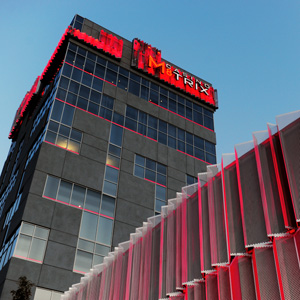San Jose City Officials have their fingers crossed that Police Chief Chris Moore will sign off on Casino M8trix‘s opening at a public hearing Thursday, July 19. If Moore gives the OK to gaming and other bundled alcohol and entertainment permits, the towering 16-story casino near San Jose’s airport can open the next day.
All of this, however, comes as a surprise to Casino M8trix principal Eric Swallow, who says there has been no contact between his partners and city officials or the police chief’s office in the last three weeks.
“Here’s what’s funny: I don’t know why they’re optimistic at this point. It’s all their show,” Swallow says. “They’re the ones that can give us the license, and I’ve always said, ‘Do what you need to do.’ I’ve said that since March.”
Assuming the chief is present at the hearing—he may be on vacation and the meeting could be postponed—city officials say they’re hopeful that Moore will give his consent, because the casino’s owners have relented on top-floor gaming and agreed to open the first floor only. Negotiations on how the top floor, also designed to host card games, will be managed would then continue.
But again, when contacted by phone, Swallow says he’s unaware of any breakthroughs.
“I don’t know what I said to make them think that, but I’m good with it,” he says with a laugh. “We’ll open that eighth floor at some point.”
Ed Shikada, the assistant city manager who has spearheaded efforts to get Casino M8trix approved, says he is “cautiously optimistic” that an agreement can be reached to open the card room’s doors. The biggest hang-up to opening the card room—transparency on the casino’s ownership—is no longer an issue.
While Swallow and partners Peter and Jeanine Lunardi, who together own and operate one of San Jose’s two current card rooms — Garden City Casino — describe the ownership structure as relatively simple, that isn’t necessarily the case. Shikada says an exhaustive effort to track the interconnected nature of their other business ventures found that as few as 14 LLCs are connected to financing Casino M8trix. Swallow put that number even higher.
“Between my partner and I, we own 18 properties,” he says. “If your analysis requires that you look at everything I own, then there would be 18 entities, and that’s because it’s real estate.”
But sources close to the situation say that some of those LLCs act as little more than shell organizations that function as intermediaries for money to be passed, which complicated the investigative process until Casino M8trix’s attorney delivered two boxes containing hundreds of financial documents on May 31, according to a letter Shikada sent to casino owners June 10.
City officials refused to provide details on what those financial documents contained, citing privacy concerns.
Swallow says constructing the towering complex, which was modeled after a Vegas-style small-scale entertainment venue, required a $38 million loan from Comerica Bank, as well $12 million in additional financing. Spending tens of millions of dollars for an empty building has made the relationship tense going back to the spring, and those figures don’t include the $1 million-plus Swallow says the casino has spent on TV and radio ads that have trumpeted what’s been little more than an oversized runway marker for pilots heading to Mineta International Airport.
To ease the tension between Swallow and the police department’s Division of Gaming Control (DGC) — which oversees Garden City and Bay 101 Casino— the city manager’s office interjected itself into the communication process. Gaming administrator Richard Teng, who Swallow called “an idiot” in a Metro story detailing the casino fight in May, still has a supervisorial role in the process but his regular communications with the casino owners stopped in the spring, with Shikada and another assistant city manager, Angelique Gaeta, assuming those duties.
Swallow has argued since March that the police department and city staff are in over their heads and/or intentionally stalling the process, and he has filed lawsuits to expedite the opening.
Santa Clara Superior Court Judge Kevin McKenney recently ruled that there was no evidence city officials have “abused their discretion” in the permitting process. But McKenney also said in his ruling that “one could conclude that this process has taken too long [and] been intrusive and duplicative.” Not exactly a stellar endorsement.
An audit performed by an outside consultant company called WhiteSand Gaming didn’t directly criticize Teng, but it did note that the DGC is ill-equipped to oversee San Jose’s 98 card tables, split equally between Garden City and Bay 101.
Teng is expected to deliver a report on Casino M8trix’s financial structure sometime in the next week, which could make for some interesting theater when it is put under the lights at the upcoming police permit hearing.
Regardless of the outcome of that hearing, though, Casino M8trix still won’t be allowed to proceed with unveiling its panoramic yet partitioned eighth floor. The rooms, which are designed for gaming open to the public and are separated by glass doors, remain a point of contention between city regulators and card room operators. Those issues have resulted in numerous discussions but few documented details on what the city would like Casino M8trix to change.
David Vossbrink, the city’s communication’s director, says the city made “significant design suggestions” to change the eighth floor to M8trix owners, but he adds that no firm details of these discussions were documented in letters or emails from the city. “It probably has been explicitly stated, but just not in memos.”
Swallow counters that he has no way to proceed without specifically knowing what changes should be made.
Despite the unexpected optimism in the process, Shikada says any talk of an opening date is still very “tentative,” because some of the city’s conditions will be spelled out “in excruciating detail” at the hearing.
“With the history of contentiousness in this relationship,” Shikada says, “I try not to take anything as a slam dunk.”

 Woodchuck BBQ
Woodchuck BBQ  SJ Q&A: Chris Moore, SJPD Chief of Police
SJ Q&A: Chris Moore, SJPD Chief of Police 







